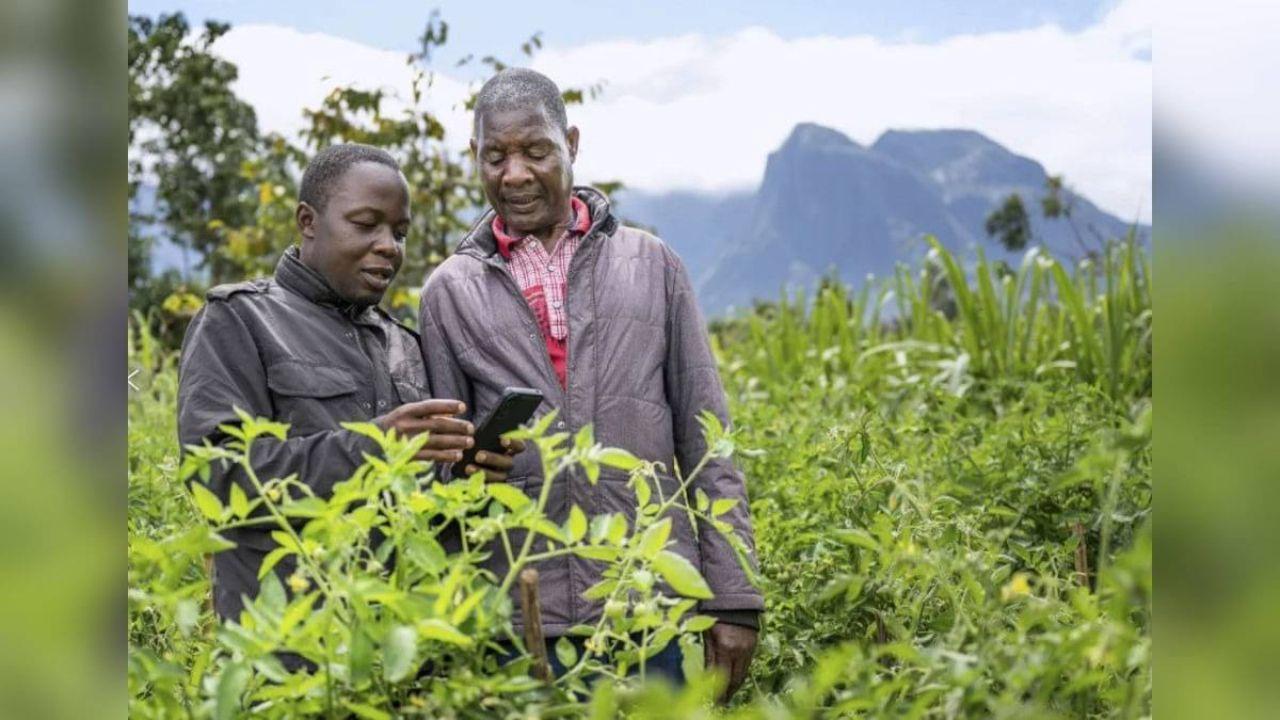
Post by : Avinab Raana
Photo : X / Republic
A Wrenching Loss Spurs New Beginnings
Alex Maere still carries the soil in his hands. His farm, once yielding hundreds of kilograms of corn per season, was almost entirely destroyed when Cyclone Freddy hit southern Malawi in 2023. His decades of toil washed away, leaving him with barely enough to feed his family. It was this devastation that pushed him into uncharted territory: adopting an AI chatbot for farming advice to rebuild and survive.
From Floods to Fresh Ideas
When Freddy struck, soil eroded, seeds rotted, and traditional methods failed. Many farmers like Maere had long relied on inherited practices suited to predictable weather. But now, with climate change bringing erratic rain, stronger storms, and shifting seasons, those old ways no longer suffice. In response, farmers across Malawi are turning to digital tools, notably a generative AI chatbot developed by Opportunity International, to gain tips on planting time, soil care, and crop selection.
How the AI Chatbot Works on the Ground
The chatbot operates via simple phone access, allowing farmers to ask questions in their own language about weather forecasts, planting strategies, and pest control. It uses local climate data and generative AI to suggest when to plant, what seeds to use, and how to protect crops from unpredictable weather. For farmers who lost everything, even modest guidance makes a difference in reducing delays, choosing resilient crop strains, and avoiding waste.
Climate Resilience Through Technology
This shift to digital assistance is more than convenience, it’s about building climate resilience. Farmers who once waited for the sky to decide are now able to plan ahead. The AI chatbot helps adjust to increasingly unpredictable weather cycles by offering adaptive strategies. Maere, for example, now selects drought-tolerant seeds earlier, divides plots to manage water flow, and times planting in sync with forecasted rains. These changes are helping his field recover inch by inch.
Barriers and Beliefs in Rural Malawi
Not every farmer trusts or has access to technology. In remote areas, limited internet or electricity, lack of smartphones, or simply unfamiliarity with AI are major hurdles. On top of that, many cultural beliefs and local wisdom favor traditional practices. Convincing farmers that digital advice can complement—not replace—what they’ve always known is a delicate task. Yet stories like Maere’s are gradually shifting mindsets: survival, after all, can demand innovation.
The Role of Nonprofits and Local Partners
Opportunity International’s role has gone beyond merely providing a digital tool. The nonprofit works with local extension agents, village councils, and weather offices to ensure the information from the chatbot aligns with local realities. When forecasts predict low rainfall, agents physically help with ground preparation; when pests emerge, community workshops supplement the AI’s pest control suggestions. This blend of tech and tradition enhances trust and effectiveness.
Food Security and Lives on the Line
In Malawi, agriculture isn’t just business: it’s survival. Many families depend entirely on small plots of land, seasonal rains, and minimal resources. Crop failures cascade into hunger, debt, and migration. For farmers who lost as much as Maere did, every lost season can mean lost school fees, dwindling savings, and insecurity. Thus, tools that help ensure even moderate yield gains aren’t nice-to-haves, they’re lifelines.
Environmental Signals and New Farming Norms
Beyond individuals, these AI-guided changes are nudging farming norms toward sustainable, climate-aware practices. Farmers are experimenting with agroforestry, contour farming, mixed cropping, and soil conservation all practices the chatbot highlights when localized forecasts suggest risks. Over time, these methods can reduce erosion, store carbon, and restore degraded land. In regions like Mulanje, these shifts may help mitigate the worst effects of climate change.
Learning Curves and Misdirection Risks
As with many emergent technologies, missteps happen. AI suggestions, while data-driven, sometimes fail to account for micro-climate quirks, soil conditions, or sudden pest outbreaks. Farmers report occasional guidance that doesn’t match local realities, leading to trial and error. Poor recommendations can waste scarce resources. Thus, balancing AI advice with local observation and experience remains essential—not blindly trusting algorithms.
Scaling Up and Inclusivity Challenges
To reach more farmers, scaling is necessary, yet challenging. Infrastructure remains patchy: areas without reliable power or internet struggle. Women, older farmers, and disadvantaged communities often have less access to phones or digital literacy. Ensuring inclusivity training, translation, user-friendly tools is central for broad impact. For smallholders who cannot yet engage with the AI chatbot, alternative solutions or support networks are vital.
Measuring Impact and Early Results
Though it’s early days, some farmers using the chatbot report improvements: better timing of planting, reduced crop loss, and more efficient use of seed and fertilizer. In places where repeated disasters previously destroyed harvests, even slight improvements in timing or variety can translate to meaningful food production. Maere himself estimates that with the guidance, he may recover a fraction of his corn output this season. These outcomes, while modest in some cases, are proof of concept in a hard climate.
Financial and Policy Support Needed
For AI-assisted farming to be sustainable, financial, policy, and institutional support is crucial. Seed subsidies for resilient varieties, last-mile extension services, affordable phone access, and poverty alleviation programs all matter. Governments and NGOs must enable frameworks for climate finance and disaster relief to intersect with tech adoption. Policies that promote open access to weather data, funding for rural connectivity, and support for digital literacy can magnify impact.
Expert Voices on Technology and Tradition
Agronomists, climatologists, and local farmers alike emphasize that AI cannot replace the wisdom built over generations. Soil types, rainfall patterns, pest cycles—these often show strong local variation. As one extension agent in Mulanje puts it, “The technology can guide, but the farmer must still read the land.” The most successful approaches blend data-driven advice with observations passed down through family and community.
Global Trends and Malawi’s Place in Them
Malawi is not alone in this story. Around the world, small-scale farmers in Asia, Latin America, and other parts of Africa are experimenting with AI, weather-prediction tools, and mobile advisory services. But what makes Malawi’s recent adoption notable is the severity of climate shocks, the speed of experimentation, and the scale of community engagement. What happens here may influence climate resilience strategies globally.
What Farmers Hope For
Farmers like Maere hope for more reliability, better forecasts, more localized data, stronger adaptation to new climate realities. They want tools that listen to them: feedback loops where chatbot advice improves over time. They want cost-effective solutions to recurring challenges—seed, soil, water, pests. They want policies that protect them from climate shocks, not just in theory, but in practice.
AI, Agriculture, and a Fragile Future
In the red clay hills of Mulanje, and across Malawi’s farms, climate is no longer a distant concern—it is immediate, harsh, transformative. The AI chatbot offers a glimmer of hope, not because it is perfect, but because it empowers farmers to adapt, experiment, and reclaim control. For those who’ve lost much, adaptation is more than survival—it is dignity. The question now is not whether this digital turn will grow, but whether it will grow with justice, inclusivity, and deep respect for land, tradition, and life itself.
Malawi farmers, AI chatbot, Climate resilience










GST Overhaul Triggers Massive Road Freight Surge in India
India braces for a huge spike in road freight as the GST overhaul and festive season drive consumpti

United CEO Warns Spirit Airlines May Not Survive Financial Struggles
United Airlines CEO predicts Spirit Airlines could go out of business due to repeated bankruptcies a

Allcargo Opens Panapakkam Logistics Park Near Chennai
Allcargo Supply Chain Launches Panapakkam Logistics Park to Boost Southern India Distribution with M

HAL Receives Third GE-404 Engine for LCA Mk1A Fighter Jet
HAL has received the third GE-404 engine from the U.S. for the LCA Mk1A fighter jet program, with an

GlobalLogic Ericsson Launch Private 5G at Hitachi Rail Plant
GlobalLogic and Ericsson have deployed a private 5G network at Hitachi Rail’s Hagerstown facility, e

Honda Cuts Bike & Scooter Prices by Up to ₹18,887
Honda lowers prices of bikes and scooters under 350cc by up to ₹18,887, making commuting more afford